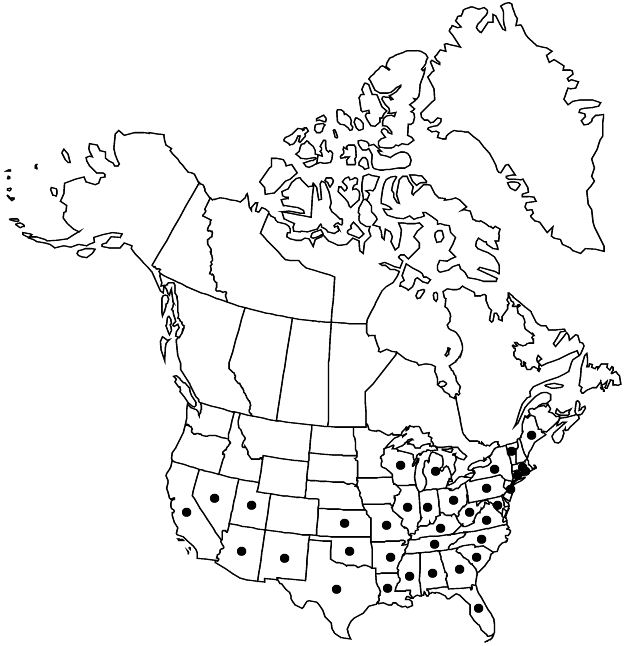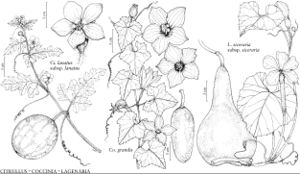Difference between revisions of "Citrullus lanatus subsp. lanatus"
FNA>Volume Importer |
imported>Volume Importer |
||
| (One intermediate revision by the same user not shown) | |||
| Line 31: | Line 31: | ||
|elevation=10–400 m | |elevation=10–400 m | ||
|distribution=Ala.;Ariz.;Ark.;Calif.;Conn.;Fla.;Ga.;Ill.;Ind.;Kans.;Ky.;La.;Maine;Md.;Mass.;Mich.;Miss.;Mo.;Nev.;N.J.;N.Mex.;N.Y.;N.C.;Ohio;Okla.;Pa.;R.I.;S.C.;Tenn.;Tex.;Utah;Vt.;Va.;W.Va.;Wis.;Asia;Africa;introduced also in Mexico;West Indies;Central America;South America;Europe;Australia. | |distribution=Ala.;Ariz.;Ark.;Calif.;Conn.;Fla.;Ga.;Ill.;Ind.;Kans.;Ky.;La.;Maine;Md.;Mass.;Mich.;Miss.;Mo.;Nev.;N.J.;N.Mex.;N.Y.;N.C.;Ohio;Okla.;Pa.;R.I.;S.C.;Tenn.;Tex.;Utah;Vt.;Va.;W.Va.;Wis.;Asia;Africa;introduced also in Mexico;West Indies;Central America;South America;Europe;Australia. | ||
| + | |introduced=true | ||
|tables= | |tables= | ||
|references= | |references= | ||
| Line 54: | Line 55: | ||
|publication year= | |publication year= | ||
|special status= | |special status= | ||
| − | |source xml=https:// | + | |source xml=https://bitbucket.org/aafc-mbb/fna-data-curation/src/2e0870ddd59836b60bcf96646a41e87ea5a5943a/coarse_grained_fna_xml/V6/V6_69.xml |
|genus=Citrullus | |genus=Citrullus | ||
|species=Citrullus lanatus | |species=Citrullus lanatus | ||
Latest revision as of 22:23, 5 November 2020
Vines annual. Stems climbing or trailing, 50–200 cm, villous; roots fibrous; tendrils 2–3-branched. Leaf blades ovate to lanceolate-ovate or ovate-triangular, mostly 8–20 cm, 3–5-lobed, lobes pinnately shallowly sinuate-lobulate, margins denticulate, surfaces hirsute abaxially, hispid on veins and veinlets, glabrous or scabrous adaxially with translucent dots. Flowers: hypanthium broadly campanulate; sepals lanceolate, 3–5 mm; petals obovate-oblong to widely oblanceolate, 7–16 mm. Pepos green, mottled with paler green and yellowish to whitish stripes, globose to oblong-ellipsoid, 12–35+ cm diam.; rind tough, not durable, mesocarp red to orange, yellow, or greenish, juicy, sweet. Seeds usually black, rarely red or of different shades, ovoid to oblong-ovoid, 7–15 mm. 2n = 22.
Phenology: Flowering Jun–Nov.
Habitat: Gardens, fields, vacant lots, trash heaps, dumps, roadsides, clearings in woods, gravel bars, stream banks, riparian thickets, dunes, volunteering from past plantings
Elevation: 10–400 m
Distribution

Introduced; Ala., Ariz., Ark., Calif., Conn., Fla., Ga., Ill., Ind., Kans., Ky., La., Maine, Md., Mass., Mich., Miss., Mo., Nev., N.J., N.Mex., N.Y., N.C., Ohio, Okla., Pa., R.I., S.C., Tenn., Tex., Utah, Vt., Va., W.Va., Wis., Asia, Africa, introduced also in Mexico, West Indies, Central America, South America, Europe, Australia.
Discussion
Selected References
None.
